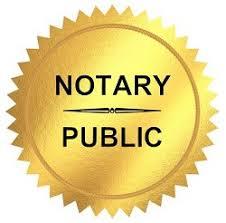DIRCO Laws Demystified: A Guide to Diplomatic Procedure
DIRCO Laws Demystified: A Guide to Diplomatic Procedure
Blog Article
Debunking Notarial Job: Simplifying the Function and Importance of Notaries
Their role, typically shrouded in secret for lots of, brings substantial weight in guaranteeing the validity and integrity of vital files. By unraveling the intricacies bordering notarial techniques and dropping light on the value of their acts, a clearer understanding arises of the crucial function notaries play in supporting the fabric of lawful and legal contracts.
The History of Notarial Job
The background of notarial work dates back to old civilizations, where scribes played a critical role in videotaping essential information and verifying papers. This led to the growth of notaries, individuals selected by the state to act as neutral witnesses in legal issues.
Throughout the Center Ages, notaries gained importance in Europe, with their features expanding to include composing lawful files, licensing signatures, and protecting documents. The increase of global profession further emphasized the relevance of notarial operate in validating contracts and contracts throughout borders.
In the contemporary period, notaries continue to play a crucial duty in lawful and business transactions by confirming identities, verifying the credibility of records, and preventing fraud. Their role in certifying the validity of agreements adds a layer of security and depend the ever-evolving landscape of commerce and law.

Responsibilities and Responsibilities of Notaries
The historical advancement of notarial job from old people to the modern-day era has formed the distinctive tasks and obligations that notaries support in lawful and organization deals today. Notaries play an important duty in validating the authenticity of documents and the identification of signatories. Among their main responsibilities is to witness the finalizing of crucial files, such as wills, actions, and contracts, to make certain that all celebrations are participating in contracts intentionally and voluntarily. Notaries likewise validate that notaries are of audio mind and not under discomfort or threat.
In addition, notaries are tasked with providing affirmations and vows, which are vital in legal proceedings and the execution of sworn statements. They license copies of original files, supplying guarantee to institutions that the copies are real reproductions of the originals. Notaries have to maintain accurate records of all transactions they manage to make certain openness and responsibility. Overall, the duties and obligations of notaries are important in securing the honesty and legitimacy of numerous records and deals.
Notarial Certificates and Signatures
Exemplifying precise attention to detail, notarial certifications and trademarks act as necessary elements in confirming the authenticity of lawful records. Notarial certifications usually consist of important info such as the date of registration, the names of the notaries, a description of the record, and the notary's main seal. These certificates provide a clear document of the notarial act, making sure that the paper can be easily identified and mapped back to the notary who oversaw the procedure.
Trademarks i thought about this play a critical function in notarial work, as they signify the agreement and consent of the parties included. Notaries meticulously witness the finalizing of papers to verify the identification of the notaries and validate that they are signing of their own cost-free will. By attaching their main seal and signature to the document, notaries accredit that the necessary treatments have been complied with and that the paper is valid and enforceable.
Essentially, notarial certifications and signatures are the characteristic of authenticity in legal deals, providing guarantee to all celebrations entailed that the files are legitimate and binding.
Importance of Notarial Acts

Notarization Process Clarified
Discussing the registration procedure provides clearness on the important actions entailed in confirming legal files. The notarization process generally starts with the private offering the document to a notary public. The notary after that validates the signer's identification through acceptable identification techniques. As soon as the identity is confirmed, the notary guarantees that the individual authorizing the paper does so willingly and without any coercion.

Final Thought

Notarial certifications typically include critical details such as the date page of notarization, the names of the signatures, a description of the document, and the notary's main seal. These certificates provide a clear record of the notarial act, guaranteeing that the document can be quickly determined and mapped back to the notary who supervised the process.
By affixing their official seal and signature to the file, notaries certify that the needed procedures have actually been followed and that the file is enforceable and legitimate.
By confirming the identification of the notaries, verifying their desire to get in right into the agreement, and accrediting the day and area of the signing, notaries play a crucial role in maintaining the validity of lawful files.After the document is signed, the notary will affix their main seal or stamp onto the paper.
Report this page